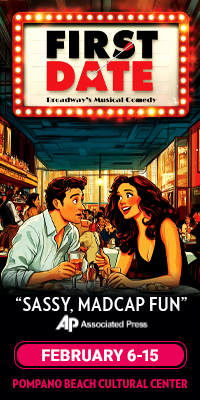
Sara Mosey dominates the family in August: Osage County (2023)
By Bill Hirschman
The best theater profoundly affects the audience and the artists simultaneously. During its challenging quarter-century journey, a Palm Beach Dramaworks production can elicit unexpected satisfaction for its founders hearing the audience’s overwhelming affirmation.
Consider when it closed this season with the world premiere of Dangerous Instruments, which depicted the nightmarish journey of a mother struggling to get the public bureaucracy to help her mentally ill son.
“I can’t tell you how many of the patrons were saying that they were sobbing at the end; it resonated with them. They knew somebody” facing that trial, said founding managing director Sue Ellen Beryl with the tenor of appreciative surprise.
“They say, ‘You are the reason we stayed in Florida’,” chimed in William Hayes, the founding artistic director and Beryl’s husband.
They repeated these memories without a smidgeon of ego, but suffused with a pride acknowledging that 25 years of arduous artistic and fiscal work have paid off in steady growth.
“There were periods of depression and doubt (when) you’re hit by these big surprises” like coping with COVID’s threat to survival, Hayes said.
“But it’s our nature to eventually say, ‘Okay, we can’t do it this way. How can we do it?’ ….When people say, ‘Well, that’s not going to work.’ Okay. Well, what will … because it’s going to happen. It’s just a matter of when and where.”
From a perfunctory standpoint, much of what they do visibly is little different than what other regional theaters in Florida strive to achieve.
But Dramaworks is widely acclaimed by audiences and donors for the unusual consistency of the quality of their work, their earned respect in the social-political fundraising corridors, and their accountant’s-level business standards keeping them in the black throughout their existence.
Tracking their growth provides lessons for both fledgling and experienced companies.
Moving through the years from tiny venues to a landmark home in downtown West Palm Beach, their one constant is memorialized in their oft-cited motto “Theatre to think about.” Audiences might see Albee or Ionesco, Lynn Nottage or Tracy Letts, realism or surrealism, drollery or drama, and notably premieres commissioned and developed by the company, often from local playwrights.
Beryl advised, “We’re not telling you what to think, but we are asking you to think about these things, holding up a mirror to society and to what’s happening in our world and shining a light on issues that need to be discussed.”
Talking about the cancel culture theme in their production of Christopher Demos-Brown’s The Cancellation of Lauren Fein, Hayes cited, “That’s the delicate balance… trying to make sure that was a balanced play… to not come heavily weighted on one side, but to present the perspectives. (We) don’t take an opinion, but we know that it’s a subject that we think is worth talking about.”

ENTER STAGE LEFT
Journalist Sheryl Flatow wrote of the firm’s origin in the company’s lush 25th anniversary book.
“Hayes was a business executive who had turned away from acting and directing to raise a family. After 18 years of corporate grind, he realized he needed to pursue his true calling. But there simply were not enough jobs locally for professional actors, and Hayes realized that if he wanted a life in the theater, he’d have to make his own opportunities. The truth is, it had been his dream ever since he was a teenager to create a regional theater company.”
He asked his then-girlfriend Beryl to be a part of it. “(Her) professional stage career began when she was nine; at 13 she appeared in a national touring production of Fiddler on the Roof.” But she responded, ‘I told him he was crazy’ before agreeing. Hayes then called a friend and fellow actor, Nanique Gheridan. He knew that she, too, was discouraged by the lack of professional opportunities.
Hayes recalled, “I told her I didn’t want to be 90 years old and wishing I would have tried.”
Hayes, Beryl and Gheridan decided “We couldn’t find work of the caliber” they sought in the county, Beryl said. But neither were they certain other residents yearned for the same fare that they did. “When we first started out… it was, ‘Let’s put on a show, kids’ thing.”
Hayes had spent 18 years in corporate upper management, and they realized that Beryl’s financial experience would be crucial and observers later noted that it was one of the bedrock elements of the company’s survival and growth.
Palm Beach Dramaworks opened December 2000 in a small, dilapidated space at Florida Atlantic University with a three-show season of Greetings, Painting Churches and Wally’s Café, and a $10,000 budget.
The following season: the urban-flavored Crossing Delancey, Camping With Henry and Tom (starting a continuing relationship with playwright Mark St. Germain), the feminist-oriented Wrong Turn at Lungfish and, starting a tradition that would blossom later, a world premiere of The Velveteen Undertow by local actor-playwright Michael McKeever.
Indeed, audiences began to come, which reaffirmed choosing provocative works the intrepid trio favored.
“We’re not trying to please everybody; we’re trying to please the people who like what we do. We looked at what we were doing as a mission; it wasn’t work. We had this dream we were fulfilling, and we just kept putting one foot in front of the other,” Beryl said.
Attitude was crucial. Beryl sees herself as the optimist: “We never really thought about how hard it was, and we were never worried that it wouldn’t happen – because things just kept happening. Back then we had day jobs, so we weren’t dependent on the theater…. Of course, our dream was that someday PBD could sustain us, and we truly believed that day would come. “
So they created a black box in a tiny storefront off Clematis Street downtown, the size of an over-large living room. They paid their actors, but went without salary themselves for seven or eight years.
“After the first year, I think we knew we were going to be successful. We just didn’t know how long it was going to take because I think we had the drive and determination and the energy and the persistence,” Hayes said.
ATTENTION MUST BE PAID
Some artistically exemplary companies have cratered over the years, but Dramaworks has grown in part because of its strict attention to what Beryl termed being “fiscally responsible.” The budget the first few years was $1 million and more recently $4 million.
“We always made sure that we never spent more than we took in,” she said. “Very often, theaters are run by artists who have no business background, and they don’t have enough financial acumen to know how to manage a budget.”
“Since day one we’ve always had a five-year strategic plan that is updated every year,” Hayes said.
The annual budget was drafted before deciding what shows would be produced. “I think in a lot of companies, particularly the younger companies, they decide the shows they want to do, whether they can afford them or not,” Hayes said.
‘You have to balance out cast costs, and then thematically, how to bring diversity into the product.”
For instance, last season, they chose to mount the two-character Topdog/Underdog with minimal scenery, balancing out with 12 Angry Men.
They took steps to impress their classic Palm Beach well-heeled clientele down to printing their show programs on high-quality stock paper. In later years, they built a robust website tracking every production it has staged and highlighting its ever burgeoning list of projects.
“I always say, put your money, your resources and your energy into the product, not the venue. Because at the end of the day, it’s about the product and the quality and making that first impression on people when they walk in the door.”
It has never been easy, Hayes assured. They made mistakes.
When they first opened with 95 percent capacity “we got too ambitious and put in extra weeks, but then we had this economic downturn and, if you came, there were 70 percent houses,” which discouraged patrons from buying subscriptions.”
But if the attendance and production values began to click, the leaders were reluctant to embrace their success until the winter of 2003 when they were producing the musical Jacques Brel is Alive and Living in Paris.
Hayes mused about the audience reaction night after night. “We couldn’t turn it off. We kept extending it. We were standing in the back (of the house), and that was a moment for s like, ‘Wow, we really did this.”

George Anthony Richardson and Jovon Jacobs in Topdog/Underdog (2023)
The growth of audiences and subscriptions piggybacked with their effort to make business-related contacts with government, social, cultural and financial powers in the community – another key to their development.
Lois Frankel, mayor in 2003-2011, said, “Having a vibrant arts community is very important to a city. It’s important for tourism, of course, but what matters most is for the people who live here to have access to creativity. When I studied what makes a city great, what makes it enticing, at the top of the list was having social offerings that bring people together for a shared experience.”
The company had moved from the tiny space behind Clematis to an 84-seat vest-pocket venue on Banyan Street just behind downtown. But frequently sold-out houses and a subscription base of about 3,500 led to a search for a much larger space.
The company eyed the Cuillo Centre for the Arts in downtown, but the possibility of a deal seemed to fall through. Then Frankel worked to cement a deal with the Cuillo’s owner with a view to boosting downtown as a cultural center. The city’s Community Redevelopment Agency bought the building for $2.85 million and leased it to Dramaworks with no interest on the rent – plus Dramaworks’ pledge to buy the building within six years.
But the theater built in 1948 needed significant overhaul to fit Dramaworks’ vision. The work began in the spring of 2010 to create a 218-seat auditorium among many other renovations, plus the search for well over $4.2 million. Thanks to donations, notably $2 million from Don and Ann Brown, led to the debut November 2011. Bolstered by a cadre of affluent supporters, Dramaworks bought the building outright in March 2015.
WHAT’S SHOWING TONIGHT?
The ascent of growth in audience and support obviously has been rooted in an ever-widening menu of polished full productions, seminars, readings, talk backs, play development, and student programs on and off stage.
That encompassed Side by Side by Sondheim, Sartre’s No Exit, The Road to Mecca, ‘night Mother and Driving Miss Daisy. The production of The Zoo Story was the first of many Edward Albee works, triumphing with Who’s Afraid of Virginia Woolf in 2006.
The menu included Ibsen, O’Neill, Miller and Pinter. More recent dependable titles included productions such as Educating Rita and August: Osage County. Throughout, they would often push past what more cautious South Florida theaters would attempt.
When Dramaworks produced race-centric works such as Lynn Nottage’s Intimate Apparel, Athol Fugard’s Master Harold…And The Boys and Lorraine Hansberry’s A Raisin In The Sun, “Eighty percent of the audience would stay to discuss the work” at talkbacks, Hayes said

Lester Purry and Karen Stephens in Fences (2019)
Over the years, they worked with Albee and critic turned playwright Terry Teachout’s Satchmo at the Waldorf; actors with national reputations such as Estelle Parsons and Maureen Anderman.
The late Albee, who had to bless any production in advance, wrote, “PBD does something most regional theaters don’t do. You don’t wait around for the commercial junk from Broadway. …You don’t waste the audience’s time…. Too few regional theaters care about entertaining and educating an audience at the same time.”
But much of Palm Beach region’s prior audience had been stereotyped as primarily favoring mainstream work and musicals. So one of Dramaworks’ re-affirmations was an edge-pushing production of Ionesco’s The Chairs in 2008 with Barbara Bradshaw and Dan Leonard and director J. Barry Lewis masterfully presenting the varying levels of absurdity.
“That really put us on the map,” Hayes said. “I took Barry into the office and I said ‘we got to give it all we got because it’s going to make or break us but this is what defines what makes Dramaworks different.”

Barbara Bradshaw and Dan Leonard in The Chairs (2008)
Quoting film director George Stevens, Hayes echoed, “Don’t underestimate your audience. They have the ability to think and to feel. Don’t dumb it down.”
“One of the reasons our organization started so small is because we had to find that audience and build that audience,” Hayes said. As far back as when Dramaworks was mounting Albee plays in that storefront, “people said we need to do this; we need some intellectual theater going on.”
Further, crucially, in the 2005-2006 season with McKeever’s Hand of God, it began a growing commitment to new work and world premieres that most local theaters had only toyed with, if at all, two decades ago. Now, years later, several area theaters interpose a new work in the schedule; Theatre Lab in Boca Raton now ten years old does nothing but new work.
But then company took a major step in 2014 with the creation of The Dramaworkshop, which invites playwrights to submit evolving works for a two-year program of readings and multi-day workshops. Managed by Bruce Linser, that resulted in two fully-staged world premieres, House on Fire and Edgar & Emily.
In 2017, the New Year/New Plays Festival began with staged readings of five plays a season until it was merged with Dramaworkshop. Since 2019, six of the seven world premieres have come from that program, including three commissioned by the theater.
“There are so few places for this to happen. It’s very hard for people to find a voice. Even good work needs the opportunity for a table reading, it needs the opportunity for nurturing and artistic support,” Hayes said.

Mark Perlberg
Among scores of board of director members who have participated hands-on, one stood out: one-time board chair Mark Perlberg who, with his wife Diane, lobbied city officials for the move to the Cuillo. He also co-founded the Master Playwrights series, underwrote the Drama (in the) Works series and was a key supporter of the annual New Year/New Plays Festival, renamed in his honor.
Perlberg, who died this year, said, “PBD is a huge part of my identity. I didn’t know that’s what it was going to become, But on a visceral level, I just feel it’s a part of me.”
In recent years, Dramaworks has expanded the inherent nature of projects, especially those mirroring the theater’s commitment to interacting with students.
** The Legacy Project: “passes down the life experiences of older members of the LGBTQ community, so that today’s teens and future generations will be aware of their predecessors’ struggles, triumphs and fights for equality.”
**Young Playwrights’ 10-Minute and 1-Minute Play Contest.
**The AcademyPBD hosts teenagers producing a play.
**The ‘Lit’ Theatre Project: an essay contest for Title 1 high school student based on a PBD production
** Free student matinees
** One Humanity Tour: a free, professional touring program aimed at middle school students, tackling extremely serious topic such as human trafficking, using locally-written work “to develop an informed, thoughtful and compassionate citizens.” Each performance includes a discussion following the performance.
OUR TOWN
The key to their growth has been to “know” the audience,” Hayes said. “Take the time to talk to them and get to know how they think, how they feel, what’s important to them, what are the subjects they’re talking about.”
Hayes and Beryl have aggressively melded with their patrons and the community—especially the social and business facets. Beryl has ceaselessly visited meetings of the Rotary, Kiwanis and similar groups.
Hayes explained that the couple attended events together, but “she’s expected to get up at six in the morning and go to the Chamber breakfast. People know me after 25 years, but they really know her in the business community; she has relationships with them because she’s at almost” every one of their events.
Beryl added, “Oh, yeah. I’ll go to the opening of an envelope. It’s not a one-time thing; it’s about that you’re showing up year after year; you’re making connections,”
 That sometimes means connecting a choice of show or a project to an interest in the community.
That sometimes means connecting a choice of show or a project to an interest in the community.
“After 25 years, there’s almost always a way to partner with somebody at some point in time. (Dangerous Instruments) focuses on mental health…. (We thought) I met these women at the Chamber two years ago who were interested in mental health. Let me reach out to them. Then they have a constituency that can come and see the show.”
They have developed a first-name relationship with the city’s leadership from the business leaders to the parks and recreation manager to the Community Redevelopment Agency.
“If you call the mayor’s office, you have to know him so well that he’s going to answer the phone because you always need something. There’s a noise issue, there’s a traffic issue…. And that takes years to develop those relationships.”
Part of that relationship is based on the community’s recognition of Dramaworks’ role directly and indirectly in rebuilding West Palm Beach’s once dormant downtown, sitting on the corner of a midtown intersection adjacent to Centennial Square.
Dramaworks might not get outright credit, “but they recognize the benefit of having us here and why they’re helpful to us in any way,” she said.
Hayes recalled, “Before we took over the Cuillo Centre, people felt unsafe downtown. I don’t think I exaggerate, but perhaps 25 percent of the spaces on Clematis Street were empty. Maybe even more than that. It felt a little shady through various periods. I’m not going to say Dramaworks is responsible, but Dramaworks certainly had an impact on keeping some restaurants alive. Obviously, it’s one of the most high-profile buildings in downtown, and it was empty for years. So just to bring that alive alone is going to bring the street alive.”

THE TEMPEST
One of the most significant challenges for Dramaworks, for the entire theatrical community, was, of course, COVID preventing patrons from sitting together in a closed space.
In January 2020, they had announced the titles of the following season for subscriptions. In September before that season started, the curtain was brought down.
The immediate need was to maintain their subscribers’ confidence in a time of total uncertainty. They transferred subscription funds to a bank account separate from their operating funds. The goal was convincing supporters that their money was safe and dedicated to when productions resumed. Whenever that might happen.
“We were one of the few institutions that did not immediately say anything,” Hayes recalled. “I think we waited a week before we calmed down, formulated our thoughts. (We believed) the best strategy is to be transparent and to let the audience know we’re okay, that we have money in the bank. We’re not going anywhere.”
“There are many periods of doubt. We never show that to the public because you need to show strength and confidence. But sure, when you have a pandemic, there were many emotional days coming into an empty theater and not knowing if people were ever going to be in the seats again…. But you can have doubt and determination at the same time,” Hayes said.
Beryl once again averred the positive: “I never felt like we weren’t going to make it. I figured we would always find a way.”

Margery Lowe in The Belle of Amherst
For two years, they did not actively solicit a dime of support. They laid off much of the staff. But they didn’t stop producing a raft of online programming and in-house projects such as readings of existing and in-development plays at no charge yet paying the actors. There was even a full video production of The Belle of Amherst complete with a full set, an elegant costume, evocative lighting and a bravura performance by Margery Lowe.
“We made it a point to show our faces every week. And because we conveyed strength, our donors stepped up to the plate just as much as they ever had,” Hayes said. In online video messages, they stressed, “This is where the organization is at. None of us know how this is going to play out, but here’s scenario A, B, C, and D as we see it about reopening. I think transparency is always the key to success.”
When it reopened, the company watched the budget closely, relying more on projections than building huge sets, confident that that so long as they maintained theatrical quality “the audience won’t know the difference as long as you’re giving them something slick,” Hayes said.
CAST OF CHARACTERS
One measure of their place in the theater community is that it would be difficult to name many experienced theater artists and employees who have not worked for the company at one time or another.
That includes 400-plus actors, 14 directors, 10 musical directors, 15 stage managers, and nearly 50 designers (although some overlapped working different posts). Some have become resident staffers such as director J. Barry Lewis, costumer designer Brian O’Keefe, lighting designer Kirk Bookman, scenic designer Anne Mundell and veteran stage manager Suzanne Clement Jones.
They regularly hire actors from the local cadre such as Beth Dimon, Jovon Jacobs, Laura Turnbull and Tom Wahl. Additionally, an unofficial repertory troupe emerged with out-of-area artists who performed have there for years, such as Rob Donohoe, Dennis Creaghan and Colin McPhillamy. Besides directing, Hayes has performed intermittently in such productions as The Dresser and 12 Angry Men.

Beth Dimon as Molly Goldberg in Ordinary Americans
His design in hiring staffers is “surrounding yourself with people that might know more about something in a certain subject matter than you do” down to the box office manager. Management makes the final decisions, but “we hire people that have more experience in certain areas than we do, then giving them ownership of their department.”
That level of talent has resulted in recognition from critics and colleagues. The Carbonell Awards program has nominated aspects of their shows more than 160 times and bestowed the award an additional 30 times plus. This fall, Hayes and Beryl will receive the group’s most prestigious George Abbott Award.
SOMETHING’S COMIN’
Like any solid business, Dramaworks’ team plans ahead in detail for an open-ended future.
Their wish list includes a permanent home for the scene shop, costume shop and rehearsal space that they now rent. They hope to own housing for the artists visiting from other Florida counties and states. The company yearns that its continuing commitment to being an incubator of new work will get national recognition. And it wants to solidify its financial stability by exploring other sources for bringing revenue.
“One of the biggest reasons we will be here 20 years from now and when I’m dead, is because we set up this institution so that is not about a face,” Hayes said, explaining why he does curtain speeches himself only on opening night. “People don’t look at Dramaworks and say, Bill Hayes or Sue Ellen. They look at it as an institution with many faces, and it’s about the work…. They’re investing in the mission and the product.”
“You have to feel like you’re investing in an institution that is transparent about everything that they do, their book audits, their budgeting, and we’ll show you anything you want to see, because you will see that we run a solid operation, and we operate in the black.”
To wit, Beryl will now concentrate on development but she has turned over much of her managing director duties to incoming executive director Rudina Toro, the chief financial and operating officer who has been auditing the company and working behind the scenes for 20 years.
“Our job now is we have to give (patrons) the confidence in the new leadership and those things.…That’s why some institutions don’t go to the next level in fundraising because (for some patrons) it’s all about the artistic director and they say, ‘The institution isn’t going to be there when ‘John Doe’ dies.’ ” Hayes said.
FINALE
 In the end, what matters is the connection to people in the audience – their ultimate lesson.
In the end, what matters is the connection to people in the audience – their ultimate lesson.
“We never really understood the impact that we were having on the community, and it still surprises us when people say how meaningful it is,” Hayes said with a mixture of pleasure and earned pride.
“They say it a lot.”
Palm Beach Dramaworks is located at 201 Clematis Street; its website is www.palmbeachdramaworks.org.
This article included some copy from Sheryl Flatow and photos from Curtis Brown, Steven Caras, Alicia Donelan, Ryan Moran, Jason Nuttle and Tim Stepein

12 Angry Men in 2022











 A PaperStreet Web Design
A PaperStreet Web Design
